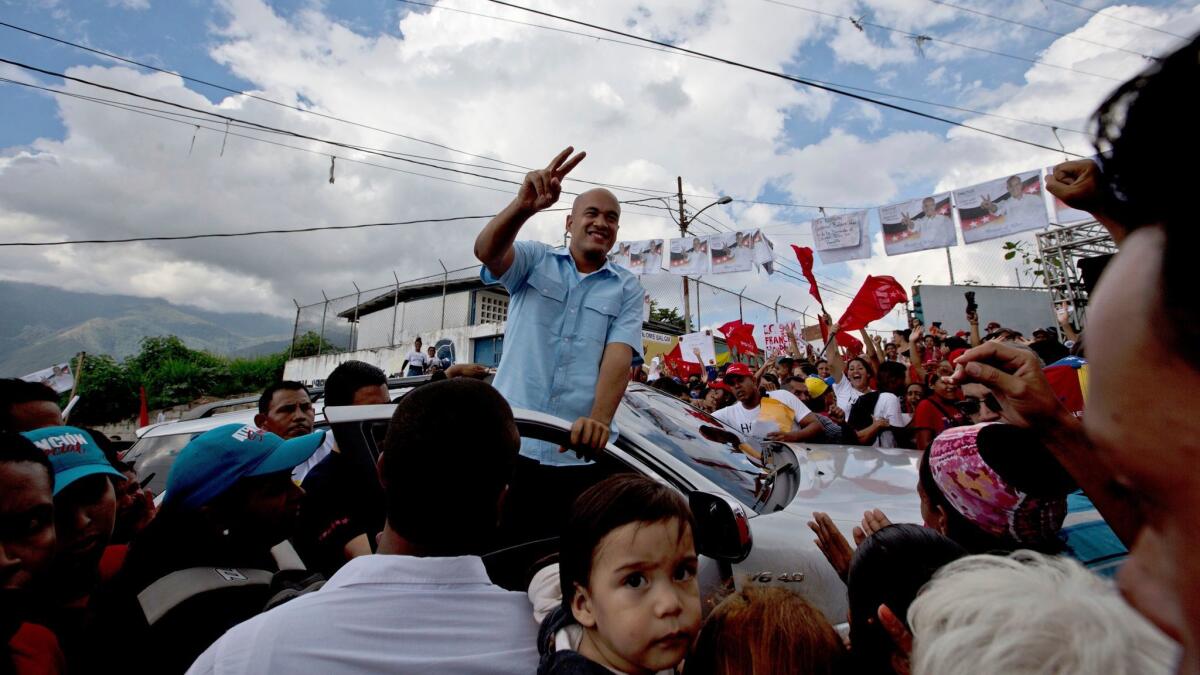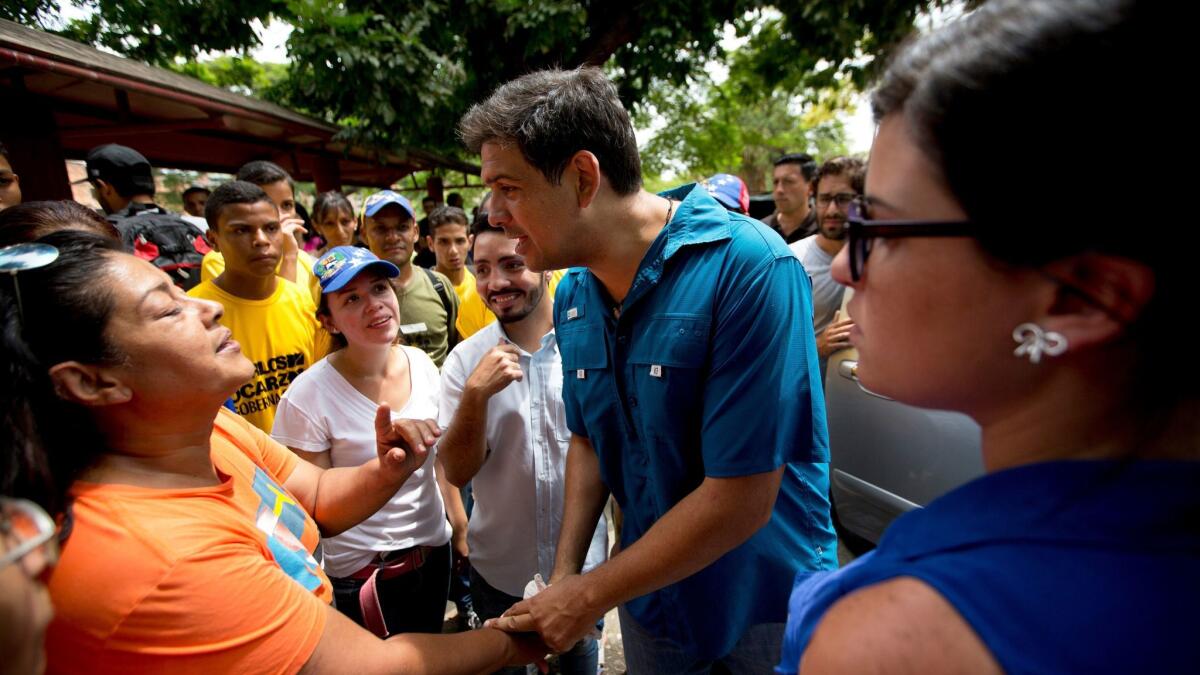Venezuela’s roiling politics may get more turbulent as voters head to polls Sunday

- Share via
Reporting from CARACAS, VENEZUELA — If circumstances were normal in Venezuela, opposition candidates could expect to sweep to victory in Sunday’s gubernatorial elections, given overwhelming voter dissatisfaction over a collapsed economy and new revelations linking unpopular President Nicolas Maduro to the Odebrecht bribery scandal.
But opposition leaders and international critics including the U.S. State Department claim Maduro has manipulated voting procedures in a bid to salvage statehouses he is in danger of losing.
Now suffering through a fourth straight year of recession, rising poverty, food scarcities and inflation exceeding 1,100%, only 1 in 5 Venezuelans approve of Maduro’s performance and 3 in 5 want him out of the presidential palace, according to polls.
“I’m voting Sunday for the simple reason I am horrified that the Chavistas could win governorships and finish destroying what little is left standing,” said Caracas store owner Beatriz Montiano, referring to Maduro’s socialist followers. “I love my country, and I don’t want it to continue in ruins.”
The president has responded to mounting opposition with increasingly autocratic measures. After opposition candidates won control of the National Assembly in 2015, the Maduro-controlled supreme court cut its powers in a series of controversial decisions. The armed forces violently suppressed street demonstrations this year, drawing criticism from human rights groups.
On Thursday, Venezuela’s former attorney general, Luisa Ortega Diaz, a Maduro critic, published a video on social media that purports to show an executive with disgraced Brazilian construction firm Odebrecht claiming he gave a Maduro representative a $35-million bribe to secure future contracts.
Maduro further upset a majority of Venezuelans by convening a constitutional assembly in August that in effect replaced the opposition-controlled National Assembly elected in December 2015. All members of the new assembly are handpicked Maduro allies.
Sunday’s elections would seem the perfect forum for Venezuelans to show their displeasure with the socialist government. Political science professor Luis Salamanca of Central University of Venezuela said state-by-state opinion surveys show opposition candidates should win a majority, even as many as 18 of the 23 statehouses up for grabs. Currently, Maduro opponents hold governorships in only three states.
“But electoral conditions have reached such a level of dirtiness that you can’t talk about fair elections,” Salamanca said.
Francisco Monaldi, a professor at Rice University in Houston, agrees that polls point to an opposition sweep of up to 21 state races because of voter fury over “an absolutely desperate economic situation that we have never seen before.” But he said few anticipate an overwhelming victory.
“The government is worried, as it should be, because polls show they will do badly if the votes are counted correctly,” Monaldi said. “But nobody expects that because of all the tricks being played.”
The tricks to which Salamanca and Monaldi referred are moves Maduro has taken to confuse the 18 million Venezuelans eligible to cast ballots. The U.S. State Department issued a statement Thursday expressing “great concern” over moves by the National Electoral Council that “call into question the fairness of the electoral process.”
That includes the decision to move 205 polling stations from neighborhoods where the opposition has up to 70% support to mostly poor, faraway barrios. The government said the move is to shield voters from potential violence, while critics say it’s intended to boost abstentions among about 700,000 affected voters.
The opposition also has slammed the government’s decision to suddenly move the election ahead to this weekend from the previously set December date in an effort to minimize opposition campaigning. Worse in the eyes of political scientist Salamanca is the inclusion of the names of losing opposition primary candidates on the Sunday ballot.

If confused opposition voters mistakenly mark ballots in favor of retired primary candidates, their votes are null and void, Salamanca said.
To further muddy the issue, Maduro said in an interview over government-run television last week that before taking power, all newly elected governors must swear allegiance to the controversial constitutional assembly, which is now drafting a new charter.
“The constitutional assembly decided that the [newly elected] governors have to swear to and subordinate themselves to the new constitution as a sine qua non prerequisite in order to assume power,” Maduro told the TV interviewer.
Opposition leaders fear that disaffected voters may stay away from the polls if they think their votes can be construed by Maduro as acceptance of the detested new assembly.
History professor Agustin Blanco Munoz of Central University of Venezuela said the allegiance prerequisite is a means Maduro is using to legitimize the new constitutional assembly in the face of fierce domestic and international criticism of it as anti-democratic. It also could dissuade opposition voters from showing up at the polls.
“This regime has shown itself to have a huge capacity for electoral tricks and fraud,” Blanco said.
What is certain amid the confusion is Venezuela’s dire economic and social condition, which ordinarily would motivate Maduro opponents to vote for change. Jose Manuel Puente, an economics professor at IESA graduate school and think tank in Caracas, said it is hard to overdramatize the crisis after four years of recession, describing Venezuela as being on the verge of “macroeconomic and social collapse.”
“It’s the worst in Latin America in 40 years,” Puente said. “In 1998, when Chavez [was elected president], the poverty rate was 45% of the population. Now, it’s 82%. Because of inflation, minimum salaries can only be equated to those of Haiti and Cuba. Indices of health and education are also falling.”
Puente blamed the “socialist economic model” promoted by Maduro and his predecessor, the late Hugo Chavez.
Monaldi, the Rice University professor, said the International Monetary Fund projects the recession will continue through 2019, by which time the economy will have shrunk 45% from the total output of goods and services generated in Venezuela when Maduro was elected in 2013.
“No democratic government would be able to sustain what Maduro is making the Venezuelan population suffer,” Monaldi said. “But this is a government with a strong grip on the military, and that’s what makes it possible.”
Office manager Maria de Rodriguez said she will vote Sunday so as not to leave the government of Miranda state where she lives in the hands of “the reds.”
“I prefer anyone to a functionary of Maduro’s government. They have radicalized us, and that is a shame because we aren’t voting for an alternative but for anyone who can stop this government from controlling everything.”
Special correspondents Kraul and Mogollon reported from Bogota, Colombia, and Caracas, respectively.
More to Read
Sign up for Essential California
The most important California stories and recommendations in your inbox every morning.
You may occasionally receive promotional content from the Los Angeles Times.










